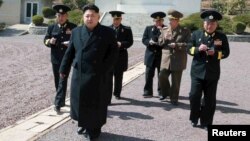The sudden cancellation of North Korean leader Kim Jong Un’s visit to Moscow has set off a new round of speculation on what is happening inside the secretive regime. Analysts believe Kim has not left the country since taking control in late 2011.
Why the supreme leader of North Korea suddenly cancelled a planned visit to Moscow next week to commemorate the 70th anniversary of the end of World War II in Europe is a mystery.
No explanations have been forthcoming either from authorities in Pyongyang nor from the official state news agency. Russian officials said the decision was “linked to internal Korean affairs.”
Kim Yong-hyun, a North Korean studies professor at Dongguk University thinks Kim Jong Un did not want to offend his economic benefactors in China by making his first international trip to Russia.
He said it seems like the North Korean leader decided not to visit Russia because he might feel uncomfortable if he encounters President Xi Jinping in Moscow.
China, through aid and trade, is North Korea’s chief food and energy supplier. So it makes sense that young Korean leader would want to make Beijing the destination of his first international trip.
However there are signs of tensions. This week China said it is investigating the killings of three villagers in a border town where North Korean guards have been accused of crossing over to commit thefts and assaults. There have also been signs of growing concern on the part of Chinese officials over the size of North Korea's nuclear arsenal.
Last month Chinese nuclear experts told U.S. officials that Pyongyang may already have 20 warheads, more than the 10 to 16 bombs U.S. experts had estimated. Beijing also believes Pyongyang has the capability to double its arsenal by next year.
This week South Korea's spy agency said it believes Kim Jong Un has ordered executions of 15 senior officials seen as disloyal. That has led to speculation about instability in the ruling elite.
North Korea analyst Daniel Pinkston with the International Crisis Group discounts theories that recent events indicate instability in the regime or any sign that Kim Jong Un is losing his grip on power.
Pinkston said the last minute cancellation is not uncommon given how North Korean security protocols work.
“Having spoken to people who met Kim Jong Un that of course the security protocol are very tight and how they operated in North Korea, the guard command which is responsible for his security, they only confirm things at the last moment,” said Pinkston.
He and a number of other analysts speculated that negotiations with Russia broke down either over protocol or due to demands one side was trying to impose on the other.
North Korea has a history of trying to extract concessions before agreeing to engage in international dialogue about limiting its nuclear program. Former South Korean president Lee Myung-bak recently revealed that in 2009, Kim Jong Il demanded $10 billion in cash and half a million tons of food as a precondition of holding a summit with the South.
These analysts say it is very possible that Pyongyang walked away after Moscow refused to provide significant foreign investment or military technologies. Or it may have been the other way around. Maybe it was Russia that asked too much of North Korea, to make some concession to restart international talks about its nuclear program or refrain from future missile tests.
Another possible scenario is that Kim Jong Un cancelled after he realized he would not play a prominent role in the Moscow commemoration. There may have been concerns that the television coverage beamed back to North Korea would undercut the cultivated image of the supreme leader as an almost divine figure.
Because of the North's tight control over information, Pinkston said much of the analysis made about the inner workings of the government in Pyongyang is more than guesswork but less than confirmed reporting.
“Sometimes you have to go forward with some underlying assumptions and understanding of how authoritarian politics operate and the experience in North Korea, the legacy of the Kim family regime, the institutional setting and all of that,” he said.
Pinkston added that it is important not to read too much into one event or decision, especially as the dynamics of power on the Korean peninsula have remained stable over time despite occasional flare-ups.
VOA Seoul Producer Youmi Kim contributed to this report.





